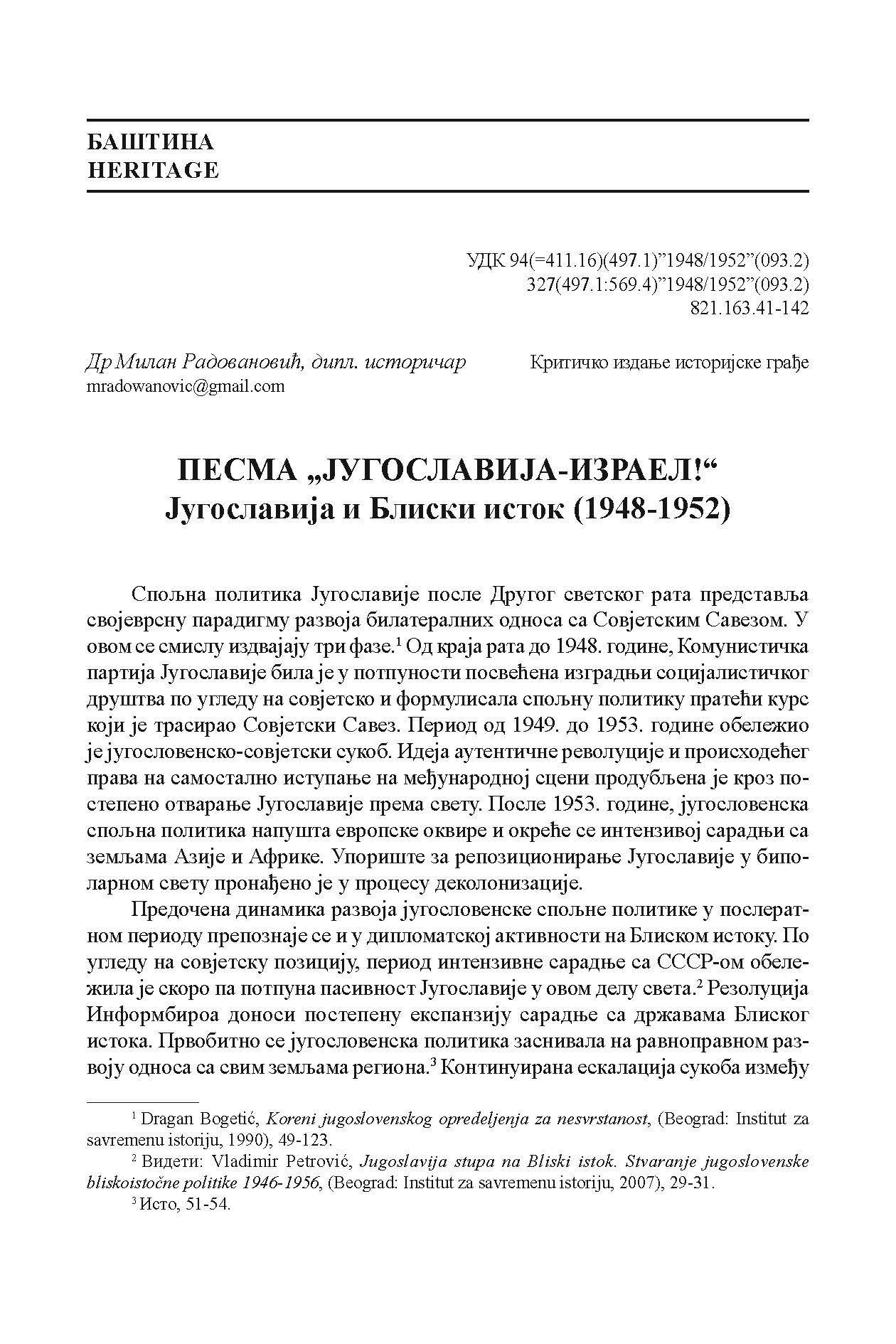Приказ основних података о документу
Pesma „Jugoslavija-Izrael!“: Jugoslavija i Bliski istok (1948-1952)
The song "Yugoslavia-Israel!": Yugoslavia and the Middle East (1948-1952)
| dc.creator | Radovanović, Milan | |
| dc.date.accessioned | 2023-10-18T20:24:15Z | |
| dc.date.available | 2023-10-18T20:24:15Z | |
| dc.date.issued | 2022 | |
| dc.identifier.issn | 0354-5318 | |
| dc.identifier.uri | https://www.jevrejskadigitalnabiblioteka.rs/handle/123456789/2566 | |
| dc.description.abstract | Spoljna politika Jugoslavije posle Drugog svetskog rata predstavlja svojevrsnu paradigmu razvoja bilateralnih odnosa sa Sovjetskim Savezom. U ovom se smislu izdvajaju tri faze. Od kraja rata do 1948. godine, Komunistička partija Jugoslavije bila je u potpunosti posvećena izgradnji socijalističkog društva po ugledu na sovjetsko i formulisala spoljnu politiku prateći kurs koji je trasirao Sovjetski Savez. Period od 1949. do 1953. godine obeležio je jugoslovensko-sovjetski sukob. Ideja autentične revolucije i proishodećeg prava na samostalno istupanje na međunarodnoj sceni produbljena je kroz postepeno otvaranje Jugoslavije prema svetu. Posle 1953. godine, jugoslovenska spoljna politika napušta evropske okvire i okreće se intenzivoj saradnji sa zemljama Azije i Afrike. Uporište za repozicioniranje Jugoslavije u bipolarnom svetu pronađeno je u procesu dekolonizacije. | sr |
| dc.description.abstract | The foreign policy of Yugoslavia after the Second World War represents a kind of paradigm for the development of bilateral relations with the Soviet Union. Three phases are distinguished. From the end of the war until 1948, the Communist Party of Yugoslavia was fully committed to building a socialist society modelled after the Soviet one and formulated foreign policy following the course charted by the Soviet Union. The period from 1949 to 1953 was marked by the Yugoslav-Soviet conflict. The idea of an authentic revolution and the resulting right to appear independently on the international stage was deepened through the gradual opening of Yugoslavia to the world. After 1953, Yugoslav foreign policy left the European framework and turned to intensive cooperation with the countries of Asia and Africa. The foothold for the repositioning of Yugoslavia in the bipolar world was found in the process of decolonization. | sr |
| dc.language.iso | sr | sr |
| dc.publisher | Beograd : Filozofski fakultet - Katedra za opštu savremenu istoriju | sr |
| dc.rights | openAccess | sr |
| dc.rights.uri | https://creativecommons.org/licenses/by-nc-nd/4.0/ | |
| dc.source | Godišnjak za društvenu istoriju | sr |
| dc.subject | Jugoslavija - Bliski istok | sr |
| dc.subject | Yugoslavia - Middle East | sr |
| dc.title | Pesma „Jugoslavija-Izrael!“: Jugoslavija i Bliski istok (1948-1952) | sr |
| dc.title | The song "Yugoslavia-Israel!": Yugoslavia and the Middle East (1948-1952) | sr |
| dc.type | article | sr |
| dc.rights.license | BY-NC-ND | sr |
| dc.identifier.fulltext | http://jevrejskadigitalnabiblioteka.rs/bitstream/id/8194/PesmaJugoslavijaIzraelOCR.pdf | |
| dc.type.version | publishedVersion | sr |
| dc.citation.spage | 93 | |
| dc.citation.epage | 99 | |
| dc.citation.issue | 1 | |
| dc.citation.volume | 29 | |
| dc.identifier.cobiss | 72768009 | |
| dc.identifier.rcub | https://hdl.handle.net/21.15107/rcub_jdb_2566 |

